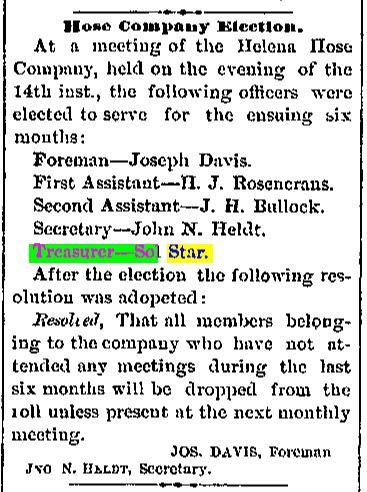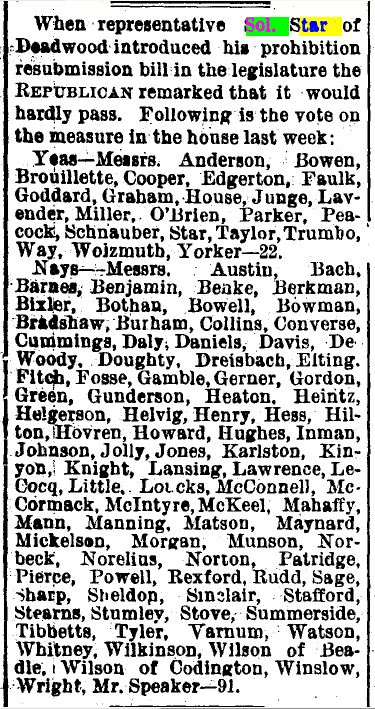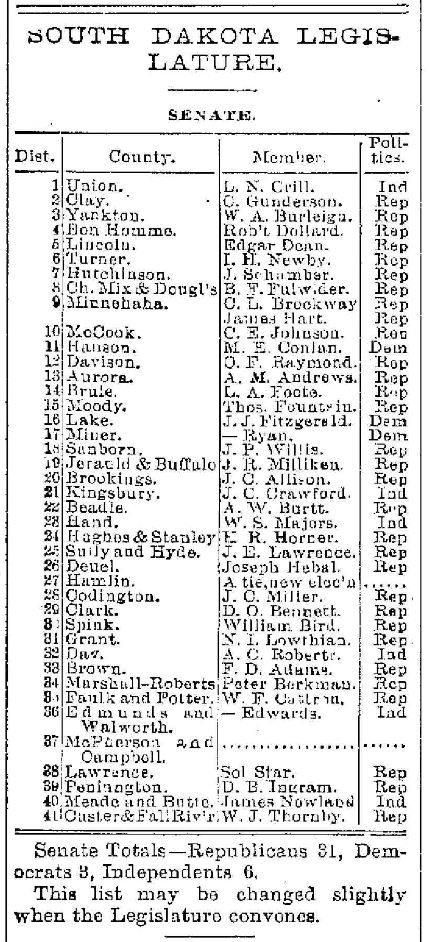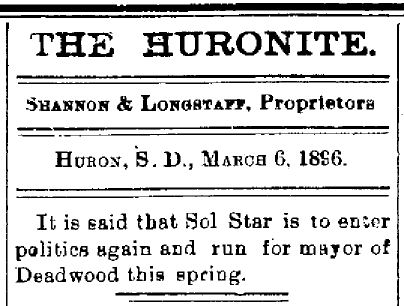While I was researching Robert V. Carr, the official poet of Seth Bullock’s Cowboy Brigade, I decided to search “Seth Bullock” to see if I could find any Carr references. That didn’t turn out to be fruitful in regards to Carr, but I did run across quite a bit more on Seth Bullock. Since I found so many news articles, I typed them up, and have decided to break them up into at least two separate posts. This first one covers Seth’s time in Montana – before he went to Deadwood. (Updated: 8/11/10)
Attempt to Break Jail.
A well conceived attempt to break jail was frustrated yesterday morning by the vigilance of Sheriff Bullock. It has been known to the Sheriff and his deputy that for several days past the prisoners were preparing to escape, but the keen eye of Bullock had watched their maneuvres, and he and the Under Sheriff have been standing guard, armed with double-barreled shot guns to prevent their escape. The prisoners had succeeded in cutting the iron of the inner door — not quite through, but leaving just sufficient uncut for the door to swing without falling down — and knowing that the outer door is not closed until about 9 o’clock at night, it was their intention to wrench the inner door from its hinges between the hours of 7 and 9 p.m. and effect their escape. Their plans were well laid and their failure is due to the strict guard kept over them.
The master spirit in the attempt was Samuel O. Duster. N.B. Larabee and Wm. Brooks (colored), also inmates, are not supposed to have been very active in the work. It was one of these latter names that informed the Sheriff of what was going on. The Sheriff has decorated the prisoners with his strongest and most approved style of jewelry; and now his slumbers are peaceful. We understand that it is the intention of District Attorney Toole to try this case mutilating or injuring county property to test the validity of the law inflicting punishment in such cases.
The Daily Independent (Helena, Montana) Apr 15, 1874

1870 Census - Helena - Seth Bullock
A SURE THING.
Saturday, May 30, at 10 o’clock.
You will find at the auction sale of Jno. E. McDonald, on Spruce and Dearborn streets, household goods, consisting of parlor, dining-room and kitchen furniture, a handsome marble top bed-room set, with English Brussels and three-ply carpets, cooking and heating stoves, a spring mattrass, a magnificent French clock, a perfect time-keeper, strikes the hours and half-hours, a water-fall, a gold finch taking his regular drinks, and music attached that will soothe a cross baby to sleep; books, magazines, chromos, etc., a Grover & Baker sewing machine, also a top buggy, with a set of gold mounted harness. Sale positive.
SETH BULLOCK.
dtd-my26 Auctioneer.
The Daily Independent (Helena, Montana) May 26, 1874

1874
Helena Engine Company No. 1.
A special meeting of the above Company will be held in the Engine House on Saturday evening at 8 o’clock to make arrangements for an appropriate celebration of the 4th of July. A full attendance is requested.
By order SETH BULLOCK,
W.J. AUERBACH, Secy. Foreman.
The Daily Independent (Helena, Montana) May 29, 1974

Sheriff Bullock started yesterday for Deer Lodge with three prisoners for the penitentiary — Lackland Frazier, Harry Clifford, and Samuel O. Duston, sentenced for one year each.
The Daily Independent (Helena, Montana) Jun 7, 1874

BOLD ROBBERY. —
Sheriff Bullock, yesterday afternoon, sent a prisoner by the name of Jimmy Phillips, now confined in jail on the charge of petit larceny, after a bucket of water. Noticing that he was gone longer than was necessary, he stepped out of the jail to see what had become of the prisoner. He, however, made his appearance in a moment or two.
Jesse Armitage’s store was near by, and he soon missed some money out of the drawer. He communicated the fact to Sheriff Bullock, who proceeded to search the prisoner, and found it upon him. This may be considered one of the sharpest tricks ever played by a prisoner in this country. While the bucket was being filled he had stepped into the store and robbed the drawer of its contents so quietly and quickly that he was not detected in the act. He then got his bucket of water and returned to the jail. Young Phillips is evidently a hard case, and nothing but iron bars will ever be able to restrain him from taking other people’s property.
The Daily Independent ( Helena, Montana) Jul 3, 1874
Here is a link with the history of the Lewis & Clark Library.
Library Festival.
The Helena Library Association will have a festival this evening in the Herald building on Broadway. No pains have been spared by the Committees to make it a pleasant affair. A noble object we trust that it will be well attended.
Committee on Arrangements —
Mrs. W.C. Child, Mrs. J.R. Gilbert, Mrs. E.W. Knight, Mrs. ?.W. Cannon, Mrs. D.A.G. Flowe??ee, Mrs. Dr. L.W. Frary, Mrs. Sam I. Neel, Mrs. Wm Sims, Mrs. A.J. Davidson, Mrs. Jon. McCormick, Mrs. A.J. Smith, Mrs. R.L. McCulloch, Mrs. T.O. Groshon, Mrs. Nick Kessler, Miss Clara Guthrie, Mr. Benj. Stickney, Wm. Nowlan, W.?. Chessman, A.H. Beattie and S.C. Ashby.
Ice Cream Committee —
Miss Lou Gutherie, Miss Mary Pope, Miss Mather, Miss Bailey, Miss Hattie Rumley, Miss Jennie Totten, Miss D. Anchel, Miss Marabel, Julia Coates, Mrs. Mae Bromley, Mr. C.G. Reynolds, Jno. Heldt, Aaron Hershfield, H. Wyttenbach, and Seth Bullock.
NOTE: I am trying to picture Seth Bullock serving ice cream!
I didn’t type all the names listed for the following committees:
Committee on Strawberries — …
Committee on Tables — …
Lemonade Committee — …
Reception Committee — …
Floor Managers — …
The Daily Independent (Helena, Montana) Jul 8, 1874
Mardi Gras Hop.
For the benefit of the Helena Library Association, will begin at International Hall, on Broadway, on Tuesday evening, February 9th, 1875.
General Managing Committee —
C. Hedges, D.S. Wade, W.F. Sanders, S. Koenigsberger, Wm Roe, John Kinna, S.H. Crounse, D.C. Corbin, W.C. Child.
Committee on Reception —
A. Sands, T.H. Kleinschmidt, A.M. Holter, R.E. Fisk, Seth Bullock, H.M. Parchen, C.A. Broadwater, W.F. Chadwick, A.J. Simmons.
Committee on Invitation — …
Committee on Music — …
Committee on Supper — …
Committee on Tickets — …
Floor Managers — …
Music will be furnished by Prof. Hewin’s band, and no pains will be spared by the Professor to make the music lively.
The hall will be kept comfortable by a stove at each end.
Tickets will be sold at the door at $2.50 each.
Supper will be served at the St. Louis Hotel, and will be separate and apart from the tickets for the hop.
The Committee on Invitations hereby extend a general invitation to all.
Dancing will commence precisely at 8 1/2 o’clock. Supper will be announced at 11 1/2 o’clock.
The Daily Independent (Helena, Montana) Feb 5, 1875

Helena Volunteer Firemen - Seth Bullock (3rd from left)
Image from Deadwood S.D. Revealed
FIREMAN’S BALL.
Washington’s Birthday, February 22d, 1875.
For the Benefit of the Fire Department.
Committee of Arrangements —
Seth Bullock, M.M. Chase, Wm. Sims, Henry Klein, A.R. Wright, Ted Sweeney, Joseph Davis, J.P. Woolman.
Committee on Supper and Soliciting — …
Committee on Music — …
Committee on Decoration — …
Committee of Reception — …
Floor Managers — …
Committee on Selling Tickets — …
The Daily Independent (Helena, Montana) Feb 20, 1875

1875
Sheriff Bullock, whose absence from town has been observed more than a week, has been heard from at San Francisco. It is surmised that his visit has some connection with a gentleman who operated here a few years ago as “our wealthy banker,” but whose last days in Helena were passed in the company of a deputy sheriff. It is rumored that the sum of $7,000 has been offered to compromise the case in suit.
The Daily Independent (Helena, Montana) Mar 18, 1875

Fred. Shaffer Captured.
Below will be found the dispatches received by Sheriff Bullock yesterday relative to the capture of Shaffer and his companions at Bismarck. These dispatches were sent by mail from Corinne, hence the delay in receiving them. We learn that a requisition will be at once issued, and an officer promptly dispatched to bring the prisoner back, and he will probably be placed upon his trial at the present term of our District Court:
BISMARCK, May 24, 1875. — To Sheriff Bullock: Fred. Shaffer and company were captured here, for the murder of Franz Warl, and lodged, by the Police Court, in the County Jail, as suspicious persons. Send instructions and requisition. Answer at once.
P.M. DAVIS, Police Justice.
BISMARCK, May 25, 1875. — To Sheriff Bullock: Fred. Shaffer is in jail here. Send requisition immediately.
WM. PIERCE.
The Daily Independent (Helena, Montana) Jun 3, 1875

A Visit to the County Jail.
Yesterday afternoon the reporter availed himself of the invitation of Sheriff Bullock to take an inside look at the county jail, and found six prisoners incarcerated there, viz: Jeff. Perkins, of Benton, convicted for assault with intent to murder, and sentenced to five years in the penitentiary; Wm. Flynn and John Stout, both for grand larceny, and sentenced to two years each in the penitentiary; an insane Chinaman, awaiting the order from the Governor for admission to the Asylum. The chief object in view was to see W.W. Wheatley and W.H. Sterres, convicted of the murder of Franz Warl, and awaiting sentence. They are kept closely locked in their cells and are very comfortable. Wheatley still protests his innocence of the blood of Warl. He claims that Sterres’ testimony, which was so damaging to him, was made in execution of the threat that both Shaffer and Sterres had made to him in case he did not leave town and should inform on them. Wheatley is certainly a weak-minded youth, and entirely devoid of principle. The reporter failed to discover the least redeeming trait in his character. It is said that the divine spark is never extinguished in man, but in his case it is very difficult to imagine it in him. He asked for the news, and as to the popular feeling regarding him, evidently indulging the hope that some degree of evidence might be given to his statement of innocence, strengthened, doubtless, by the recommendation to mercy, attached to the verdict of the jury, who found him guilty of willful and premeditated murder. He is not afraid to die; is only 25 years old; the world has many claims for him. He has a brother in Bismarck. Rev. Mr. Shippen has called twice to see him. He clings tenaciously to the hope that the sentence of death may not be executed upon him; but if he must die he has the consolation of knowing and feeling that he is guiltless of the terrible crime of murder.
William H. Sterres is entirely penitent, and has no hope that he will not be sentenced, and that it may not be carried into execution. He expects to die, and is anxious that his execution may not be long delayed. Shortly after his arrest he sent for Rev. Father Palladino, who visits him almost every day, and has supplied him with religious works to prepare him for baptism, which is to be conferred on him next Monday. Sterres has a wife and child in Sioux City. Conscious of the enormity of the crime for which he is to suffer, he is resigned to offer on the altar of justice the sacrifice of his life as the penalty of the law. The reporter left the jail a sadder man than when he entered it, impressed with the feeling that the sufferings of ta conscience burdened with such a terrible crime must be more acute than a thousand deaths.
The Daily Independent (Helena, Montana) Jun 20, 1875

Prickly Pear Creek - Photo by mmerrick
Larger photo and a map can be found on Panoramio.
On the afternoon of the 21st, while Sol Star and Seth Bullock were en route for Benton by private conveyance, and while attempting to ford the Prickly Pear, they met with an accident which nearly resulted in the loss of their lives.
It appears that when their team had reached the middle of the stream, the horses became frightened at some floating brush, and bolted down stream. Below the ford the water was deep and the current swift.
After strenuous efforts they succeeded in getting the horses and buggy out all right, but on the same side of the stream they started in from. The parties and their effects were thoroughly drenched, they retraced their way to Firgus’ ranch for repairs, and proposed to make another attempt next day.
–Herald.
Butte Miner (Butte, Montana) Jun 27, 1876
FOURTH OF JULY, 1876.
The One Hundredth National Anniversary.
Names of Officers and Order of Procession.
Officials.
William F. Wheeler, Chief Marshal of the Day in charge of the procession; Henry Wyttenbach and Charles J.D. Curtis, aids and assistants; Seth Bullock, James M. Ryan, E. Frank, L.P. Sterling, Ben R. Dittes, John O’Meara and E.T. Johnson, Assistant Marshals.
Order of Procession.
1ST DIVISION.
In charge of Henry Wyttenbach, Assistant Marshal:
Helena Silver Cornet Band.
Minute Men of 1776.
2D DIVISION.
In charge of Seth Bullock, Assistant Marshal, and the several officers of the Helena fire Department:
The several Fire Engine, Hose and Hook and Ladder companies.
Car of State, in charge of C.M. Travis and is two assistants.
3D DIVISION.
In charge of L.P. Sterling, Assistant Marshal:
Carriages for President of the Day, Chaplain, Orator, Historian, invited guests from abroad; also for Governor and other United States, Territorial and county officials.
4TH DIVISION.
In charge of James M. Ryan, Assistant Marshal:
Catholic Benevolent and Total Abstinence Society, and other societies of Irish citizens, under their society officers.
5TH DIVISION.
In charge of Dr. E. Frank, Assistant Marshal:
Helena Gesang Verein Harmonia and German citizens,
Montana Lodge No. 1 I.O.O.F., in charge of its officers.
6TH DIVISION.
In charge of Capt. John O’Meara, Assistant Marshal:
Base Ball clubs according to seniority of organization, under their respective Captains.
Boys from the schools, under charge of teachers or men appointed by the Principal of the Schools.
Mining delegations and citizens from abroad.
Citizens on foot, in carriages and on horseback.
7TH DIVISION.
In charge of E.T. Johnson, Assistant Marshal:
Colored citizens of Montana.
8TH DIVISION.
In charge of Ben R. Dittes, Assistant Marshal:
Ancient and Honorable Artillery.
Helena Commandery of Knights Templar, commanded by the Eminent Commander, T.H. Kleinschmidt.
All organizations desiring to join the procession are requested to meet at their several halls or places of rendezvous at 9 o’clock a.m., and to be on the most convenient side street, near the head of main, at precisely half past nine, ready to take their proper place in the procession as the head commences to move down Main street.
All who are not so ready will fall into the rear of the procession as it passes them.
Assistant Marshals will each be held responsible for bringing their respective divisions promptly into line.
The line of march and subsequent proceedings will take place in the published programme. The whole procession will move at 10 o’clock precisely.
W.F. WHEELER,
Chief Marshal.
The Helena Independent (Helena, Montana) Jul 2, 1876

CENTENTIAL FOURTH.
The Celebration in Helena.
The Centennial Fourth was ushered in amid the roar of artillery and the merry ringing of bells. The entire population seems to have arisen at an earlier hour than usual, in order to partake to the fullest extent in the ceremonies and rejoicings of the day.
The long procession in its march through the streets was received everywhere with waving flags and encouraging smiles.
The Helena Fire Department was very fully represented and made a very creditable appearance. The two very handsome banners which they used on this occasion for the first time, was the gift of Mrs. L.B. Wells, and the fireman may well be proud of them.
The Car of State was very handsomely decorated.
The Little Continentals attracted general admiration.
The Knights Templar formed one of the most attractive features of the procession.
The members of the Catholic Benevolent and Total Abstinence Society presented a very fine appearance in the parade.
The Continentals were greatly admired and were one of the finest features of the procession.
The colored citizens under the Marshalship of Col. E.T. Johnson, were a prominent feature.
The Gesang Verein Society was a noticeable feature, the members all wearing “chips.”
The Irish citizens turned out in large numbers and the green flag of Erin was universally complimented.
About 12 o’clock the procession reached the Court House where the reading of the Declaration of Independence, the delivery of the Oration and the reading of an address by the Historian of the Day and singing by the Gesang Verein took place.
After dark a torch-light procession moved through all the principal streets and fire-works enlivened Tower Hill.
The celebration was a perfect success and reflected credit on the Committee of Arrangements and the citizens who so generously seconded their efforts to make memorable the celebration of the Centennial birthday of the Great American Republic.
Marshal Wheeler and his efficient aids deserve great credit for the successful manner in which the parade was conducted. Many persons made the remark that Col. Charles J.D. Curtis excelled himself in his splendid horsemanship and graceful carriage.
The Helena Independent (Helena, Montana) Jul 6, 1876

Attention, Firemen.
All members of the Fire Department are requested to be at the Clore street Engine House at 2:30 p.m. to-day to attend the funeral of Thos. Ewing.
SETH BULLOCK, Chief Engineer.
The Helena Independent (Helena, Montana) Jul 6, 1876
These last two are later articles, but they refer to Seth’s time in Montana:
A Boom Town in Montana.
Helena Journal.
I call to mind the time when there was a big boom in Billings, and everybody thought they had struck the spot for a second Chicago. Before the railroad reached Billings men came from the Black Hills, where all you could hear was the great boom Billings was having, and what a lively place it was. Seth Bullock, a merchant of the Hills, sent a stock of good to Billings. In a month or two he thought he would ride over and see how his store at Billings was progressing. It was between 300 and 400 miles, and Seth went on horseback. He rode along and was pretty well tired out when he got into the Yellowstone Valley, and about 9 o’clock one night, when he thought he must have gone far enough, he met a man.
“Can you tell me where Billings is?” asked Seth.
“You’re in Billings now,” replied the stranger.
“Am, eh?” said Seth, rather puzzled.
“Well, if that’s the case can you tell me where I can find Seth Bullock’s store.”
“It’s on this street about fifteen miles from here; just keep right straight ahead.”
Seth was about the worst surprised man you ever saw, but he found it pretty near as the stranger had said.
Fort Worth Daily Gazette (Fort Worth, Texas) Jun 12, 1890

GLAD HER HUSBAND WAS HANGED.
Experience of a Montana Sheriff with the Widow.
Ex-Sheriff Seth Bullock of Lawrence county, South Dakota, one of the early Indian fighters of Montana and the Dakotas, was in a reminiscent mood and among other things he told how he was thanked for hanging a man, says the New York Sun. A murder was committed just after he had been elected sheriff, and, as no murderer had even been brought to justice up to that time in the territory Bullock became famous for having captured the first two men charged with such a crime. Said Mr. Bullock:
“I rounded up a white man and a negro who had red hair and a bad reputation. The negro was a barber from Sioux City, and he came to Montana hunting trouble.
“I had the country so well organized at that time that the courts had a chance to try these men. They were convicted and sentenced to be hanged. Taking life by order of the court was a novelty in Helena, and the people gathered by thousands to see see the hanging.
“Shortly before the hour set for the execution the marshal brought me an order from the court granting a stay of execution for thirty days in the case of the negro. I saw that the crowd would probably be disappointed, and might take exceptions to the order of the court, and I swore in a lot of deputies to stand off the trouble I expected. One of my deputies on that occasion was Sam Hauser, who was afterward elected governor of Montana.
“The white man was duly hanged, and when the crowd saw that a man hanged on a scaffold was just as dead as one lynched on a tree they demanded the negro. I had erected a high board fence around the jail and placed my deputies on the inside, and when the crowd began to scale the fence they were met by the deputies with clubs.
“There was a hot time for several minutes, but when the leaders had been clubbed into docility they concluded to let me hang the negro in my own way. There was not a shot fired, and thirty days later the negro followed his white companion on the gallows.
“Some time later I had business in Minneapolis. A good-looking, well-dressed colored woman called on me at the hotel.
“‘Be you Seth Bullock?’ she inquired. I told her I was. ‘You hanged my husband last year, and I want to thank you.’ She had been married to the man in Sioux City and he had treated her brutally.”
Omaha Daily Bee (Omaha, Nebraska) Apr 20, 1898
































